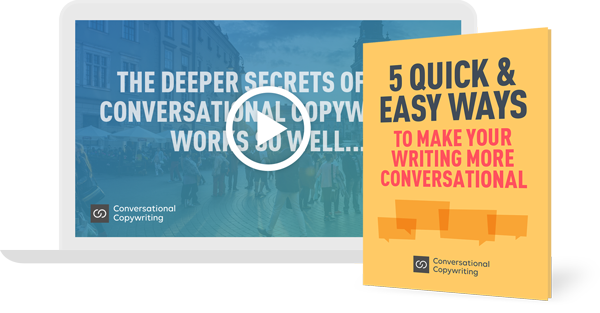
I get asked this question from time to time.
Can conversational copywriting go head-to-heard with traditional, direct-response copywriting and win?
Well…
If you’re talking about making an immediate, direct sale from the page of a website…
And if you’re executing a side-by-side, A/B split test, and comparing revenues before the end of the day…
Then no, the conversational approach is unlikely to win.
But you’re probably asking the wrong question.
To illustrate what I mean, let me fall back on the tried and tested dating analogy.
Two guys go into a bar…
Frank and Dave.
Frank has his sights on scoring a one-night stand. Tonight.
Dave is in no rush. He’s looking for a long-term relationship. Sure, he’ll strike up a conversation with a girl who catches his eye, or who catches his. But he’s not focused on the short term. He wants to attract someone who is interested in building a long-term relationship.
Frank has a collection of killer pick-up lines.
Dave just wants to be himself, enjoy a good conversation, and get to know someone.
Frank is about “closing the sale”.
Dave is about engagement, trust and his long-term goals.
That’s the difference between hard-selling direct response copy and conversational copy.
I know… there are plenty of grey areas in-between.
But you get the point.
Conversation copywriting comes out on top when you’ll be working one-on-one with your clients.
If you’re selling steak knives on late-night TV, knock yourself out. Use your best pick-up lines.
If you never get to meet your customers and don’t much care what they feel about your product or service, so long as they paid for it, keep hammering away at your next group of prospects.
But… if you’re in the kind of business where you’re building long-term relationships with your clients, everything changes.
You can’t afford to be seen as a pick-up artist.
You don’t want prospective clients to see you as anything other than open, honest and transparent.
This applies to you if you’re a freelancer, coach, therapist, consultant or anyone else who builds trust-based, one-on-relationships with their clients.
The words you use on your website and in your mails have to ring true.
Your sales copy has to reflect your own character and voice.
It has to be the most persuasive version of YOU.
If you’re not sure what that sounds like, just think back to the last time you spoke to your kids about the importance of doing their homework, or helping with chores.
You were being persuasive… selling your point of view… but without sounding like a marketer or a salesperson.
You were selling, but in an open and transparent way.
This is what conversational copywriting is all about.
It’s for those of us who are building a business or practice that depends on building relationships based on transparency and trust.
If that sounds like you… if you’re looking for long-term relationships and not one-night stands… your next step may be to find out more about my course on Conversational Copywriting.

One of the metrics we should all keep in mind for our business and those of our clients is the lifetime value of the customer. Anyone can use a hard sell direct response approach to slam dunk a quick sale. If your business model is all front end and very little back end that might be the way to go. But it’s not the smart way to go. The initial customer acquisition is the hardest and most expensive part of the customer lifecycle. To do the hard part over and over again is not smart or profitable. Using Conversational Copywriting to build a relationship based on trust and transparency is going to be more profitable and more satisfying in the long run.
Such a great comment! Encapsulates everything I’m trying to say in the post… and you do the job in just 11 lines! : )
William, thank you for explaining the difference between hard-sell direct response copywriting and conversational copywriting in your comment to this blog post.
Hi Nick–
I suppose there’ll always be room for selling knives on late-night TV. As well as the plethora of pick up lines for one-night stands.
I think that you (meaning ‘you’ as all of us who are proponents of conversational copywriting. But ‘you’ as in ‘should consider taking this position’) could go as far as to say that the traditional sales model is antiquated … or dead.
Even though it’s aged, the Gene Schwartz’ adage, “the river of desire, the river of self-expression, and the river of belief” still holds true, I believe, for the conversational copywriting world.
The difference is: will you use this power to be helpful, or for the short-term-quick-fix? Will the conversational copywriter use this knowledge to make a difference in the world?
Your analogy is resonates well. I believe the conversational style will begin to eclipse the normal 2% response rate simply because the conversational copywriter WILL choose to nurture relationships. Our world of communication is making that easier to do.
I really appreciate the thoughtful feedback. You make some great points. : )
Nick, agree with you…one on one has to be conversational to work. Even if you have a hard sell project going, some conversational language can and should be used.
Your example of Frank and Dave analogy in the bar….Frank is the pick up artist with all the “killer lines”. Could be if Frank used some conversational language with his lines, he might improve the “quality of the one night stands”… Who knows?
Thanks for this good reply to a question I recently raised with you, Nick.
If you’re a copywriter trying to decide which skills to learn, your answer suggests that it depends on what kinds of clients you want to attract. If your clients want high-volume, “transactional” sales, maybe traditional direct-response is the better skill for you to hone. But if your clients are looking for longer-term relationships with their customers, conversational is the better way to go. This is an important distinction for any copywriters who work with clients in B2B markets that sell high-value products or services.